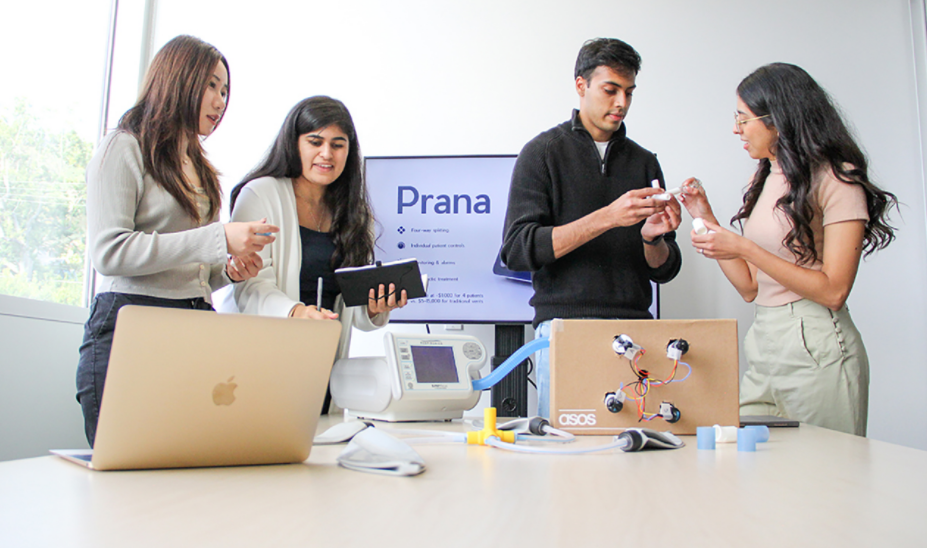Meet Prana, a ventilator startup

Prana is a passive, multi-patient attachment for medical ventilators that allows up to four patients to share a single continuous positive airway pressure (CPAP) machine safely. Ventilators are a critical medical device used to treat numerous respiratory diseases from Chronic Obstructive Pulmonary Disease (COPD), to preterm infants whose lungs have not fully developed at birth. The machines deliver a constant level of air pressure to a patient’s upper respiratory tract in a non-invasive way. Prana’s aim is to help solve the issue of ventilator shortages in hospitals by allowing multiple patients to receive treatments from the same CPAP at once, while also reducing costs—Prana costs less than $2,500 per unit serving four patients, compared to traditional non-invasive ventilators that can cost up to $17,000 per unit, per patient.
The idea for Prana was spearheaded by MDes student, Abhi Ghavalkar, after graduating from Loughborough University in 2019. Inspired by a 2006 paper published by The Society for Academic Emergency Medicine on clinical research into the use of ventilator splitters, Ghavalkar, and his former classmate, Zach Mudge, soon developed their first prototype.
But despite the potential impact Prana could have on the medical community, Ghavalkar found it difficult to connect with a creative community to continue the research and development of Prana. Before joining the UC Berkeley MDes program, he had contacted more than 40 individuals, universities, non-profits, government agencies, and disaster-relief organizations—none of which led to the collaboration he was hoping for. This quickly shifted after his arrival at Berkeley in late 2020, where he joined forces with Mercedes Saldana and Peipei “Penny” Lin, two fellow members of the inaugural MDes cohort.
“This project would have died if I hadn’t come to Berkeley,” Ghavalkar said. “Just knowing that I have access to so many fantastic people and resources — that’s lifted our effort more than anything else. I couldn’t be more grateful to be here.”
The team applied to the Jacobs Innovation Catalysts grant, a grant opportunity that provides funding and mentorship to early-stage projects. They quickly began working on the second Prana prototype after receiving the grant of $2,000 in January of 2021. Simultaneously, the team enrolled in a challenge lab class, Innovating Through Crisis, facilitated by the Sutardja Center for Entrepreneurship & Technology (SCET). Athena Lopez, a bioengineering undergraduate whose previous work had impressed the team, joined the project as the sole bioengineering student.
Now composed of 12 people, the team has finished their second prototype and has continued to accelerate with community support and group effort. Over the past year, Prana has won the Gold Award in the medical device, emergency equipment category at the New York Product Design Awards; was named a finalist in Fast Company’s World Changing Ideas Awards; won the Social Impact Prize at the San Francisco Design Week Awards, and was named a Student Notable Project in the health and wellness category in the Core77 Design Awards.
The team was also accepted into the CITRIS Foundry Incubator and the Berkeley SkyDeck Accelerator’s Pad-13 program; and completed both the Haas School’s UC Student Entrepreneurship Program and the National Science Foundation’s Innovation Corps.
The future looks bright for team Prana. Moving forward, the team plans to submit their device for official medical device approval, with the goal of having one batch operational in the market within the next two to three years.